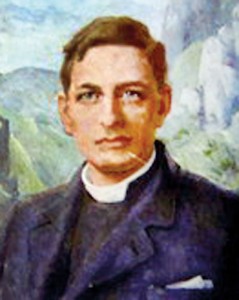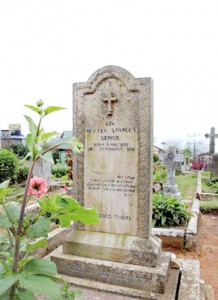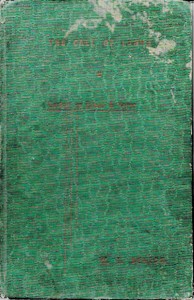‘It can never be Goodbye’ for us in distant lands

Rev. Walter Senior and below, his tombstone at St. Andrew’s Church Haputale
On the eve of another independence day in Sri Lanka, with nostalgia I recall the first Independence Day celebrations I attended with my father at Bogambara grounds in Kandy. Just seven years old then, I didn’t quite understand what it was to get freedom after many centuries of foreign rule. Yet, I still could feel the pulsating sense of a new beginning from all the grown up talk around me, so that it remains a milestone in my memory.
Sixty nine years later, trawling with quite some anguish through the many crises we have since gone through as a nation – several brutally suppressed southern youth uprisings, the recurrent racial riots culminating in the pogrom of 1983 which uprooted so many of us from our native soil and scattered us haphazardly in foreign lands (which graciously provided us with a second home), the prolonged civil war which followed with its wanton waste of lives and property until the war was declared over in May 2009, much to the relief of many and the unwept erasure of others – I feel impelled to write this particularly because we have yet to see the ‘reconciliation’ that is so much talked of.
It is against such a background that I re-read the Rev. Walter Senior’s The Call of Lanka: Ceylon in Prose & Verse (Kandy; Trinity College Press. 1960) gifted to me many years ago by my godmother, Miss Eva Van Schoonbeek of Trinity College.
It was the Rev. A. G. Fraser, (Principal of Trinity College Kandy between 1904 – 1924) who persuaded the Rev. Walter Stanley Senior to join the staff of Trinity as Vice-principal. Senior arrived in 1906, just 30 years of age, and there begins the journey of a remarkable man who was to write, ‘In Ceylon, the best twenty years of my life were spent. It is the land of my life-work…’ The Editorial Preface to this book says, ‘A man of the West of the highest stature of mind and spirit came to the East and was entranced. The message of his love is plain writ in the pages that follow, writ with eloquence and elegance, in piety and in truth, in language of surpassing beauty.’
Throughout the book, Senior’s sheer love of our land spills over, compelling in its purity, radiant in its beauty – He writes, ‘The Paradise is Ceylon, the loveliest of lands…Ceylon with its low-country of gorgeous colour and its up-country of delicious coolness; …that casts a spell on all who ever come within her borders, drawing them back, and still back to herself.’ Senior says part of the aim of his prose was ‘…to arouse,…in others some similar love of Lanka…and of the love which it and its people can inspire.’
When I read the words written many decades ago by this foreign poet and scholar who came to love us and the beauteous land around us with such an intense love, I ask myself with immeasurable pain and regret, where could we ‘thine own children, born of thy womb’ (Senior) have gone so very wrong? How could we have allowed ourselves to let go of this essential ingredient for making our land a true home to all alike of its people, at the cost of wreaking such havoc on ourselves?!
In a Foreword to this book, Canon R. S. de Saram writes, in 1959, prophetic words ‘…the appearance of this book is timely. It has a message for us and sets before us an ideal which we in our day are tending to neglect – to our country’s great loss.’

Pic courtesy tripadvisor
In the poem ‘The Call of Lanka’ Senior writes:
I climbed o’er the crags of Lanka
And gazed on her golden sea,
And out of her ancient places
Her soul came forth to me.
“Give me a Bard,” said Lanka
“My Bard of the things to-be.”
…..
“My sceptre is long departed
And the stranger is lord instead.”
“Yet, give me a Bard,” said Lanka
“I am living, I am not dead.”
…..
“The pride of the past is pulsing
Hot in the people’s veins.”
“Give me a Bard,” said Lanka,
“A Bard for my joys and pains.”
In response, Senior ‘offer (s his own) voice (to) Lanka’, though in self-effacing awareness that he is but the ‘child of an alien isle/(whose) heart has heard thee, and kindled.’ He asks Lanka, ‘Foster-Mother’ to ‘take…and use it’, hastening to add no less humbly, ‘ ’Tis but for a while.’ For in assured expression of belief in her, he affirms,
For surely of thine own children,
Born of thy womb, shall rise…
He (who) shall hymn thee,
singing of ‘whatsoever is fair in Lanka’, its waterfalls, its lakes and lotuses, its shrines,
But most shall he sing of Lanka
In the brave new days that come
When the races all have blended
And the voice of strife is dumb.
Each year, Independence Day renews the hope, the stirrings of which I first felt on February 4, 1948, that Senior’s prediction will some day come true, that someone will emerge to offer a new beginning, new expectations to heal our land. If a foreigner from our colonial past can transcend the limits of his colonial place and time to revere us so much, how is it that loud noises/voices in our midst, still prevent us from hearing Senior’s voice of pure love for our beloved land and its people?
Senior’s ‘Hymn for Ceylon’, set to the inspirational music of ‘Dhanno Buddunge’ by Deva Surya Sena, we all know so well.
Lo! we this island’s watchmen
would give and take no rest…
Till our dear land be blessed…
Give peace within her borders
‘Twixt man and man good will
The love all unsuspicious
The love that works no ill;
In loyal, lowly service
Let each from other learn,
The guardian and the guarded,
Till Christ Himself return…
He writes with warmth and admiration to capture the splendour of our heritage - Polonnaruwa, Dambulla, Nalanda, Mihintale, the Abhayagiriya Dagoba (‘the thrust of its dome through the azure’), Sigiriya (‘precipitous bee-blanketed Rock’), the stone sedent Buddha in Anuradhapura (‘…there it sat …fair and unconventional of face, closed eye, lost since centuries to life and longing in Nirvana’); and much else.
Of Sri Pada, he writes, arduous though the climb was for him, ‘the Peak is once more weaving spells and a spirit in one’s feet is drawing one back…I was able to rejoin the eddying crowd on the little platform of the peak, down-rushing on all sides and to walk round the parapet wall reading the relief-map of Ceylon at unutterable distance below…I also rang the Buddhist bell at the western side of the wall four times for my four ascents: while a woman of the pilgrims rang it thirty-one times!’ “Apey Buddha” cried the leader of the pilgrim train…following that strong man came an old, old man gasping and fighting for breath…came women of lowland villages…with babes in their arms.’
Not included in this collection is the Trinity College hymn ‘Where River, Lake and Mountain meet’, once again written by Senior, which calls upon the boys of Trinity to
‘…constant serve with might and mind
The school, the land that bore thee…’
When his health was failing him he wrote ‘Goodbye?’
So you’ve had enough of the tropics, and the back is growing
bent,
And the heart is not so buoyant, and it’s time you packed
and went…
Yet, O My soul, remember: when you have sailed the seas away…
…better than places – faces…
With (their) brown and olive beauty, the youths and maids you’ve
known;
And the tender pearl of India in the black and brilliant eye: –
My soul, you will break with longing – it can never be Goodbye.’
And so it happened, when he was dying in England, he requested that his ashes be laid to rest at St. Andrew’s Church in Haputale.
Engraved on his tombstone are the following words from his poem ‘Lanka from Piduru Tallagala’

A book that holds precious memories
‘Here I stand
In spirit, as in body once I stood
Long years ago, in love with all the land
This peerless land of Beauty’s plenitude.’
Many of us too, now in distant lands, can only humbly echo Senior’s words, ‘It can never be Goodbye.’
Indranee Kannangara Kandiah (Perth, February 4, 2017)


